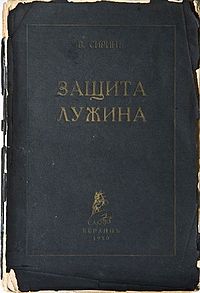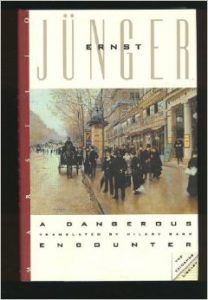There are more than two hundred belletristic works in my library in which the game of chess plays a more or less important role. Here I have chosen the – in my humble opinion – thirty best novels with chess as one of or the main topic (randomly sequenced):
- Vladimir Nabokov: The Defense
- Fernando Arrabal: The Tower Struck by Lightning
- Rudolf Jakob Humm: Spiel mit Valdivia
- Stefan Zweig: The Royal Game
- Ichokas Meras: Stalemate
- John Brunner: The Squares of the City
- Barry N. Malzberg: Tactics of Conquest
- Walter Tevis: The Queen’s Gambit
- Robert Löhr: The Chess Automaton
- Bertina Henrichs: La joueuse d’echecs
- Elias Canetti: Auto-da-fe
- Paolo Maurensig: The Luneburg Variation
- Thomas Glavinic: Carl Haffner’s Love of the Draw
- Fabio Stassi: La rivincita di Capablanca
- Ronan Bennett: Zugzwang
- Wilhelm Heinse: Anastasia or The Chess Game
- Gustav Meyrink: The Golem
- Samuel Beckett: Murphy
- Guillermo Martinez: Regarding Roderer
- Andy Soltis: Los Voraces 2019
- Ernst Jünger: A Dangerous Encounter
- Friedrich Dürrenmatt: The Chess Player
- Yoko Ogawa: Swimming with Elephants
- Ilya Ilf/Evgeny Petrov: The Twelve Chairs
- David Szalay: The Innocent
- Jesse Kraai: Lisa
- Jennifer DuBois: A Partial History of Lost Causes
- Michael Chabon: The Yiddish Policemen’s Union
- Ignacio Padilla: Shadow without a Name
- Arne Danielsen: The Highest Rank
Just for the record, there is at least one excellent novel available in English translation that is featuring the game of Go: Kawabata Yasunari, The Master of Go (trans. by Edward Seidensticker), Vintage.
© Thomas Hübner and mytwostotinki.com, 2014. Unauthorized use and/or duplication of this material without expressed and written permission from this blog’s author and/or owner is strictly prohibited. Excerpts and links may be used, provided that full and clear credit is given to Thomas Hübner and mytwostotinki.com with appropriate and specific direction to the original content.






 Facebook
Facebook RSS
RSS Twitter
Twitter